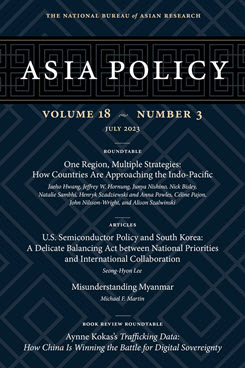Article from Asia Policy 18.3
U.S. Semiconductor Policy and South Korea
A Delicate Balancing Act between National Priorities and International Collaboration
This article provides insights on how U.S. semiconductor policy is reported, discussed, and perceived in the South Korean public sphere and proposes potential actions for Washington and Seoul as allies.
EXECUTIVE SUMMARY
MAIN ARGUMENT
Although not widely known in Washington, the U.S. faces accusations of pursuing “economic nationalism” at the expense of its allies. There are growing perceptions in South Korea that the U.S. is prioritizing its own self-interests while concurrently emphasizing unity among its allies against China. This view has led to grievances about U.S. strategy, particularly in relation to the semiconductor sector and supply chains—sensitive topics in Northeast Asia’s trade-focused economies. While the U.S. has advocated for an alliance-centered reorganization of semiconductor supply chains, concerns persist that it is ultimately pursuing semiconductor hegemony. Increasing public discontent in South Korea regarding U.S. semiconductor and technology policies serves as an illustrative example and could develop into a contentious issue for the broader alliance between the two countries unless handled with care and attention to South Korea’s concerns. While Washington may disregard South Korean public sentiment as inconsequential, in South Korea’s vibrant and vocal democracy, public opinion can quickly shift to the extremes and significantly influence Seoul’s policy choices. To maintain a strong alliance with South Korea and effectively advance its policy regarding China, the U.S. must closely monitor South Korean public opinion and confront these concerns.
POLICY IMPLICATIONS
- Economic sacrifices made by allies will not benefit U.S. national interests and may lead to disenchantment and resentment on the part of these partners. It is imperative that the U.S. engage in dialogue with its allies to enhance economic collaboration and explore new market opportunities.
- The public uproar observed so far in South Korea’s young democracy has the potential to suddenly turn volatile. Consequently, preventive public diplomacy by Washington can play a crucial role in managing the semiconductor issue.
- A technology alliance commits countries to jointly secure their national interests; thus, mutual trust and a shared vision for the future are essential.
Seong-Hyon Lee is a Senior Fellow at the George H.W. Bush Foundation for U.S.-China Relations and a Visiting Scholar at Harvard University’s Fairbank Center for Chinese Studies (United States). Previously, he served as director of the Center for Chinese Studies and the Department of Unification Studies at the Sejong Institute in Seoul. He is the author of The U.S.-China Competition: Who Will Rule the World? (2019).
About Asia Policy
Asia Policy is a peer-reviewed scholarly journal presenting policy-relevant academic research on the Asia-Pacific that draws clear and concise conclusions useful to today’s policymakers. Asia Policy is published quarterly in January, April, July, and October and accepts submissions on a rolling basis. Learn more


